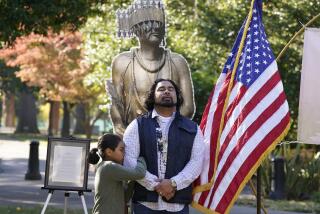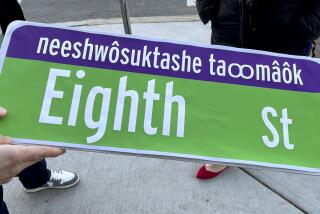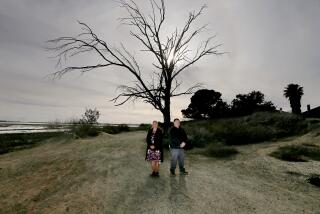‘Lost’ Language of Indians Returns With the Swallows
- Share via
SAN JUAN CAPISTRANO — For half a century, Evelyne Villegas-Lobo saved six tattered loose-leaf pages bearing scribbled words from the language spoken by her mother, a Juaneno Indian.
Only a few years ago, Villegas-Lobo turned the pages over to anthropologists and a few members of her tribe. Curiosity piqued by the odd mix of syllables, they quietly began to research the obscure Indian language, which historians and others feared had been gradually lost since Spanish priests built Mission San Juan Capistrano in 1776 to convert the Juanenos to Christianity.
To their delight, tribal leaders discovered that scraps of the language had been preserved through songs, prayers and oral history.
Today, for the first time in the 216-year history of the mission, Acagchemem (pronounced Ha-SHAY-mem) will be spoken during the traditional St. Joseph’s Day Mass.
For some locals, the reciting of the Lord’s Prayer in Acagchemem threatens to overshadow the day’s big event--the traditional ringing of the mission bells to welcome the swallows to their spring nesting grounds.
But few are complaining.
“I would feel very proud to hear this language spoken inside this hallowed church,” Villegas-Lobo said. “This language represents the very heart of me. It’ll be like hearing my grandmother speaking once again.”
The history of the mission and the Juanenos has been intertwined ever since Father Junipero Serra tapped the American Indians to build the now-historic structure.
At one time, the tribe occupied an area stretching from Laguna Beach south to Oceanside and as far east as Lake Elsinore. Today, about 1,500 remain in California, with 300 in southern Orange County, tribal leaders say.
Inclusion of the language and other Juaneno rituals in this year’s Swallows Day Mass is a sign that a deep rift between the Indians and the mission is healing, tribal leaders and mission officials said Wednesday.
Two years ago, the Juanenos gathered outside the mission on Swallows Day to protest what they said was their diminishing role there after the firing of the mission’s business manager, a Juaneno Indian.
Tribal leaders and mission officials have been meeting during the past months to resolve the tensions between the groups.
As a sign of reconciliation, tribal leaders and Msgr. Paul Martin will attend a peace-pipe ceremony at the pastor’s house before the Mass.
“All the troubles are not fully resolved, but we like what we’re hearing from Father Martin,” said David Belardes, chairman of the Tribal Council of the Juaneno Band of Indians. “The mission is our home away from home. Our people have lived there, been baptized and buried there, and we always want our traditions to be honored and recognized there.”
Steven Holtkamp, a spokesman for the monsignor, said the pastor was pleased that the liturgy spoken during the ceremony today will include people whose ancestors “were the original converts of Father Serra.”
“Our church is for everyone and the original converts do share a special place here,” Holtkamp said.
That Acagchemem will be spoken during the ceremony has some historians surprised--but equally ecstatic.
“I thought it was a lost language,” said Pamela Gibson, a historian who has written three books on the history of this mission town. “It’s fantastic and however they did it is an amazing contribution to the entire ceremony.”
Using Villegas-Lobo’s pages as a crude sort of base text, tribal members asked other Juanenos if they remembered any words or phrases from their parents and grandparents, Belardes said.
Some elders recalled the Lord’s Prayer, which Monica Arcy of Riverside will recite today. Arcy will also dress in traditional costume to perform Indian rituals during the church ceremony.
“It’s an overwhelming feeling,” Arcy said. “Tears come to my eyes because I realize that I will be speaking to the Creator in the language he gave my ancestors. That’s a beautiful experience.”
Villegas-Lobo, a lifelong resident of the city who was given the honorary title of Matriarch of San Juan Capistrano, said she was heartened by the inclusion of Juaneno rites in the Mass.
“Our parents and grandparents always taught us that we should not aim to own anything,” Villegas-Lobo said, “that we should preserve the environment for the next generation. I feel good that now the little children can benefit from what we’ve preserved.”
More to Read
Sign up for Essential California
The most important California stories and recommendations in your inbox every morning.
You may occasionally receive promotional content from the Los Angeles Times.













